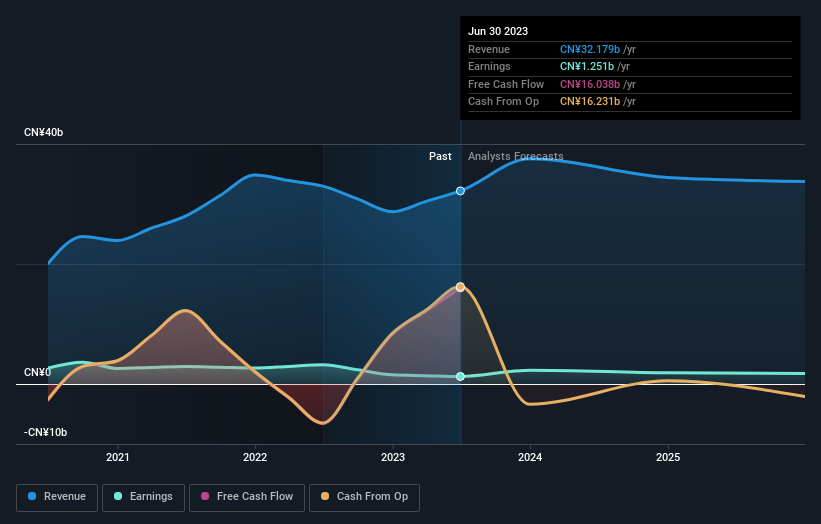With a 74% stake, Yanlord Land Group Limited (SGX:Z25) insiders have a lot riding on the company
Key Insights
Insiders appear to have a vested interest in Yanlord Land Group's growth, as seen by their sizeable ownership
72% of the company is held by a single shareholder (Sheng Jian Zhong)
Past performance of a company along with ownership data serve to give a strong idea about prospects for a business
If you want to know who really controls Yanlord Land Group Limited (SGX:Z25), then you'll have to look at the makeup of its share registry. With 74% stake, individual insiders possess the maximum shares in the company. In other words, the group stands to gain the most (or lose the most) from their investment into the company.
So it follows, every decision made by insiders of Yanlord Land Group regarding the company's future would be crucial to them.
Let's delve deeper into each type of owner of Yanlord Land Group, beginning with the chart below.
See our latest analysis for Yanlord Land Group
What Does The Institutional Ownership Tell Us About Yanlord Land Group?
Institutional investors commonly compare their own returns to the returns of a commonly followed index. So they generally do consider buying larger companies that are included in the relevant benchmark index.
Institutions have a very small stake in Yanlord Land Group. That indicates that the company is on the radar of some funds, but it isn't particularly popular with professional investors at the moment. If the company is growing earnings, that may indicate that it is just beginning to catch the attention of these deep-pocketed investors. It is not uncommon to see a big share price rise if multiple institutional investors are trying to buy into a stock at the same time. So check out the historic earnings trajectory, below, but keep in mind it's the future that counts most.
Hedge funds don't have many shares in Yanlord Land Group. Looking at our data, we can see that the largest shareholder is the CEO Sheng Jian Zhong with 72% of shares outstanding. With such a huge stake, we infer that they have significant control of the future of the company. It's usually considered a good sign when insiders own a significant number of shares in the company, and in this case, we're glad to see a company insider with such skin in the game. In comparison, the second and third largest shareholders hold about 1.6% and 1.4% of the stock. Interestingly, the second-largest shareholder, Siliang Zhong is also Senior Key Executive, again, pointing towards strong insider ownership amongst the company's top shareholders.
While studying institutional ownership for a company can add value to your research, it is also a good practice to research analyst recommendations to get a deeper understand of a stock's expected performance. There is some analyst coverage of the stock, but it could still become more well known, with time.
Insider Ownership Of Yanlord Land Group
While the precise definition of an insider can be subjective, almost everyone considers board members to be insiders. Company management run the business, but the CEO will answer to the board, even if he or she is a member of it.
Insider ownership is positive when it signals leadership are thinking like the true owners of the company. However, high insider ownership can also give immense power to a small group within the company. This can be negative in some circumstances.
Our information suggests that insiders own more than half of Yanlord Land Group Limited. This gives them effective control of the company. Given it has a market cap of S$1.3b, that means they have S$960m worth of shares. Most would argue this is a positive, showing strong alignment with shareholders. You can click here to see if those insiders have been buying or selling.
General Public Ownership
The general public-- including retail investors -- own 22% stake in the company, and hence can't easily be ignored. While this size of ownership may not be enough to sway a policy decision in their favour, they can still make a collective impact on company policies.
Next Steps:
It's always worth thinking about the different groups who own shares in a company. But to understand Yanlord Land Group better, we need to consider many other factors. To that end, you should be aware of the 2 warning signs we've spotted with Yanlord Land Group .
But ultimately it is the future, not the past, that will determine how well the owners of this business will do. Therefore we think it advisable to take a look at this free report showing whether analysts are predicting a brighter future.
NB: Figures in this article are calculated using data from the last twelve months, which refer to the 12-month period ending on the last date of the month the financial statement is dated. This may not be consistent with full year annual report figures.
Have feedback on this article? Concerned about the content? Get in touch with us directly. Alternatively, email editorial-team (at) simplywallst.com.
This article by Simply Wall St is general in nature. We provide commentary based on historical data and analyst forecasts only using an unbiased methodology and our articles are not intended to be financial advice. It does not constitute a recommendation to buy or sell any stock, and does not take account of your objectives, or your financial situation. We aim to bring you long-term focused analysis driven by fundamental data. Note that our analysis may not factor in the latest price-sensitive company announcements or qualitative material. Simply Wall St has no position in any stocks mentioned.

 Yahoo Finance
Yahoo Finance 

